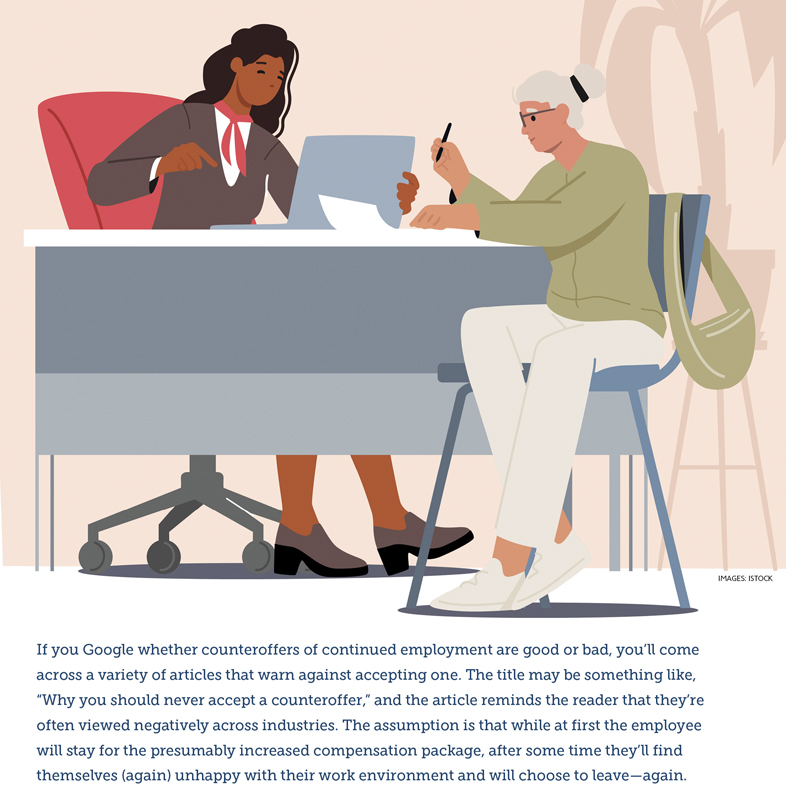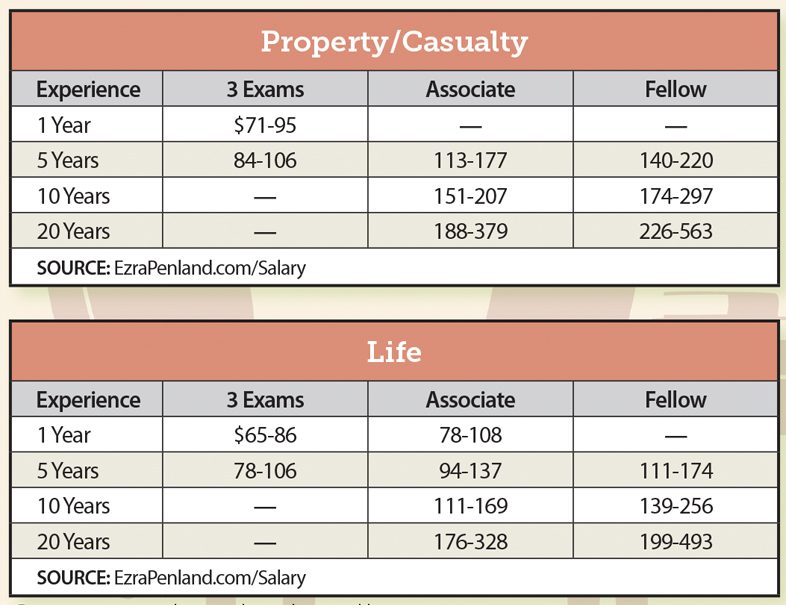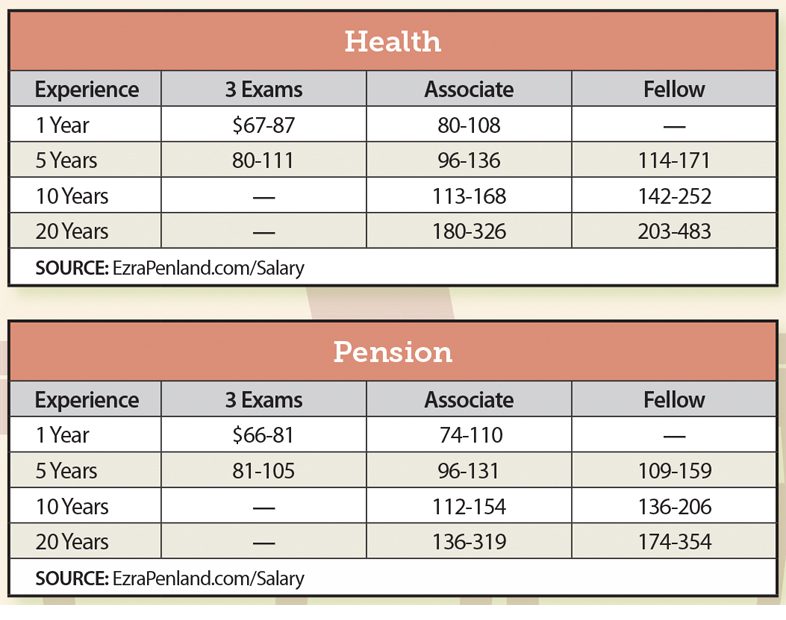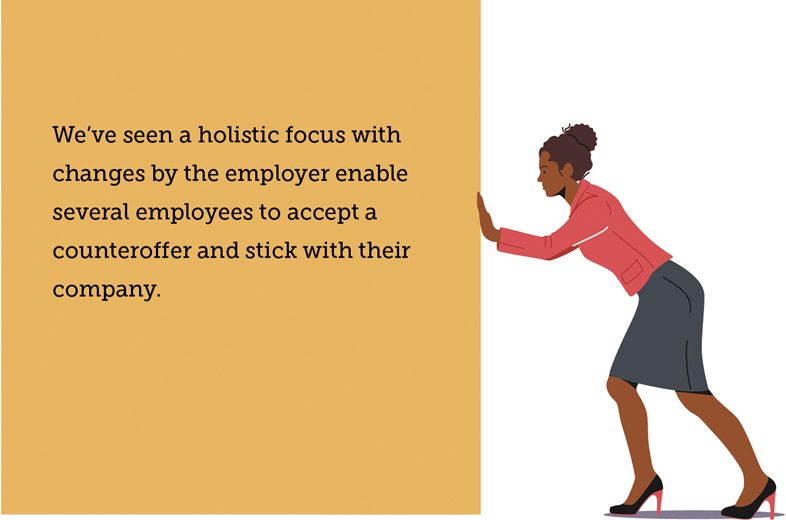The current job market has seen the emergence of this unique tactic—Here’s what you need to know.
By Eliana Schechter and Sally Ezra

And this dynamic may become a self-fulfilling prophecy—even if the employee is now happy, they may be passed up for a promotion because of having given notice in the past. And thus, a new job search commences.
One study by LiveCareer, a job-search firm, found that of employees who accept counteroffers, around 75% will leave within three years for another role. For the company, it has only delayed what seems like an inevitable outcome—that the employee will be productive for some time and then firmly choose to leave. Of the hiring managers LiveCareer surveyed, “around 37% still believed it set a bad precedent” even if the candidate stayed with the company, and likewise experienced “trust issues” with the employee at hand. On the other hand, a 2017 study by Dow Scott of Loyola University Chicago and Thomas D. McMullen of Korn Ferry Hay Group of 120 human resources professionals at primarily midsize and large organizations reported that 59% believed their relationship with the employee had not changed, and for 16%, things had even improved. Leadership in these cases used criteria of whether employees were in key or critical positions and how they had performed to decide whether risking a counteroffer was worth their time and resources.
As recruiters, our job is to assist our company’s clients in finding the talent they need, and to help individuals meet their career goals while also improving their lives. Often that improvement includes greater financial rewards. With that in mind, it is often not in a recruiter’s best financial interest to suggest a candidate discuss a salary increase with their current employer. Ideally asking for a raise would be done prior to getting an offer elsewhere, but starting in 2022, we saw this happen numerous times only at the point when a candidate was considering an offer elsewhere. (The consideration of the counteroffer in this market seems unique to the actuarial field given the limited candidate pool and relatively small professional network.)


In the past, as recruiters we would warn people of the dangers of accepting a counteroffer. In the past year, though, we have explained to people that all companies have had challenges figuring out how to compensate their current employees. It has felt unsavory to companies to pay more to hire someone from the outside than what they are paying their current employees. However, so many companies have had to do just that to fill roles. We have had more companies coming to us to discuss salaries and to get our counsel as to what they need to do to retain their valuable actuarial team members. They want to “do the right thing”—but increasing so many salaries to create internal equity with newer hires or to hopefully create higher retention is a pretty big ordeal, and it often takes time. It often takes so much time that employees starts looking at outside opportunities to make sure their salaries are not lagging during a hot market. This dynamic has in turn created a situation where we have—more than ever—seen the only motivation of candidates to look elsewhere be for an increase in compensation.
The recent actuarial market looked incredibly different than in past years. Many people received increases in compensation of 20% to 40%—and sometimes higher—when making a move. News of these offers led their colleagues and acquaintances, including those happy with their current employer, to consider outside opportunities where they might be compensated at the going market value. Their employer is simultaneously determining how to manage compensation when growing their teams in a candidate-driven market in which new talent costs significantly more to bring onboard, while also recognizing that hiring someone at this salary point would leave their existing team behind from a compensation standpoint. Internal equity has been blown up and companies are struggling with what to do next, when these conversations have gone beyond standard cost-of-living increases or even an 8% salary increase.
Considering these factors, we’ve seen a change in why counteroffers are being made. If in the past the counteroffer was monetarily based, it is now more holistic and emphasizes the value of the employee to their team and larger company. We’ve seen candidates have positive experiences in this market with not only increased compensation but also receiving active acknowledgment of their career goals and needs by their employer.
Why Are Candidates Looking?
As recruiters focused on the actuarial profession, we feel integrated within the actuarial community, and our goal is to ensure we’re giving the best long-term career advice to candidates. The actuarial community is relatively small, and we want to see that what should happen is what does happen. More than ever before, we have seen that staying with a current employer really can be the ideal situation for the candidate … if the employer can improve their compensation.
We encourage candidates to consider their motivations for making a move and to examine the choice from all angles, thinking about what is potentially available for them internally and what their timeline looks like. Everyone must look out for their own best interests, and while compensation is of course a relevant interest in this process, there are usually multiple other factors also at play as to why someone is looking outside their company.

A key part of the question regarding what makes a successful counteroffer is why the candidate is seeking new employment to begin with. We often encounter candidates seeking new opportunities for the usual reasons, such as better pay or more responsibility—whether supervisory or management—and better aligning their work with their interests. Yet, the pandemic brought other reasons to the top of the list for many candidates. Candidates sought remote work and flexibility, a need that seemed to coincide with conversations around childcare arrangements and the pandemic’s effects on schooling and childcare shortages.
McKinsey’s research on the Great Resignation found that parents were facing harsh conditions during the COVID-19 pandemic and were more likely to leave their jobs than their nonparent counterparts. Both workload and the ability to work remotely factored significantly into these parents’ decision to leave their jobs and reflect the reality that we’ve seen in conversations with actuaries who are parents. Women were especially affected, finding themselves responsible for childcare throughout the workday as their children were home, even as they worked hard to keep their productivity up and careers on track.
When the pandemic began to ease and the kids returned to in-person schooling, working parents found that they did not want to lose the flexibility of being able to do a 3 p.m. school pickup. We spoke with a number of new parents in the past year who sought flexibility in not returning to the office after their parental leave and found themselves needing to find childcare in a tight and expensive market. Prior to the pandemic, many may not have cited family reasons for the need in flexibility for fear of penalization, whereas the pandemic and this happening en masse began to make the reality of childrearing apparent for employers at large.
Still, many employees felt that working from home brought them increased flexibility while maintaining or exceeding their pre-pandemic productivity levels, and this increase in remote work productivity was reflected in studies cited by Forbes. We also spoke with a few candidates who sought flexibility through a hybrid work-from-home and in-office basis where they could have a distinct workspace; some wanted a new environment as they felt isolated from their teams when working from home.
Holistically Considering the Counteroffer
When the primary goal is increased compensation, perhaps their current employer can match that. More often than not, there is a desire for new challenges and responsibilities—whether that means more leadership involvement or a change in area of focus—and in these COVID years, an increased desire for flexibility. We’ve seen this holistic focus with changes by the employer enable several employees to accept a counteroffer and stick with their company. In a moment of conflict, their employer emphasizes their value and their future growth, and they feel deeply recognized for their work.
Still, in a fast-moving actuarial market, the moment to assess these concerns and respond turns on a dime when an employee brings news of an impending offer and has only a few days to decide. Several candidates we’ve worked with have had executives meet with them and evaluate how their responsibilities could be reorganized and shifted to address their desires and concerns—and to remind them how vital they are to the company’s mission through these changes.

For example, one candidate felt stuck in a status-quo situation at his current company and was considering moving to a competitor where he could lead their main initiative and have a 10% salary boost. When he spoke to his employer about this possibility, they quickly regrouped and considered how they could more actively include him on newer initiatives with leadership opportunities while matching the competitors’ offer. Another candidate, around the manager level, was considering a move with a 20% salary increase where he would have the potential for a promotion in a year once he was up to speed in their line of business. His company actively courted him about an upcoming assistant vice president promotion in the next year with responsibilities and compensation that would far outpace the other company’s offer. Both chose to stay with their current companies.
And yet, we also spoke with several candidates who brought news of their offer to their employer, received a counteroffer focused on increased compensation, and turned it down; ultimately, they recalled that the reasons leading them to look elsewhere for work had not changed.
In our work as recruiters, we see that employers who pay regular attention to their employees’ needs and respond quickly and thoughtfully in these critical moments demonstrate the strength and care their employees seek. They demonstrate trust and promise. Good job to these companies for doing what they can in a fast-moving market.
Most of the time, we have stood by the premise that it is not good to accept a counteroffer, but this market has been the exception for some. We will all see what the future brings on this question.
ELIANA SCHECHTER and SALLY EZRA are with Ezra Penland Actuarial Recruitment.
Endnotes
1 “Exploring the Pros and Cons of Employee Counteroffers”; LiveCareer.
2 Current Thinking on Counteroffers: A Survey of Rewards and HR Professionals; Loyola eCommons, School of Business: Faculty Publications and Other Works; Fall 2017.
3 “Married to the job no more: Craving flexibility, parents are quitting to get it”; McKinsey & Company; Dec. 3, 2021.
4 “Pandemic Could Scar a Generation of Working Mothers”; The New York Times; June 3, 2020.
5 “Three Things Lockdowns Have Exposed About Working and Parenting”; The New York Times; April 27, 2020.
6 “Workers Are Less Productive Working Remotely (At Least That’s What Their Bosses Think)”; Forbes; Nov. 3, 2022.





